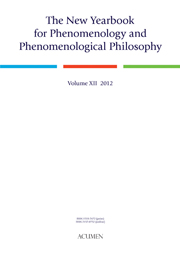Book contents
- Frontmatter
- Contents
- Articles
- Three Levels of Historical Analysis in Early Heidegger
- Heidegger's Schematism of Life and its Kantian Inheritance: A Critical Appraisal
- Husserl's Mereological Semiotics: Indications, Expressions, Surrogates
- Process and Relation: Husserl's Theory of Individuation Revisited
- Mathesis Universalis and the Life-World: Finitude and Responsibility
- Multiplicity, Manifolds and Varieties of Constitution: A Manifesto
- Phenomenology in the United States
- Documents
- In Review
Phenomenology in the United States
from Articles
- Frontmatter
- Contents
- Articles
- Three Levels of Historical Analysis in Early Heidegger
- Heidegger's Schematism of Life and its Kantian Inheritance: A Critical Appraisal
- Husserl's Mereological Semiotics: Indications, Expressions, Surrogates
- Process and Relation: Husserl's Theory of Individuation Revisited
- Mathesis Universalis and the Life-World: Finitude and Responsibility
- Multiplicity, Manifolds and Varieties of Constitution: A Manifesto
- Phenomenology in the United States
- Documents
- In Review
Summary
Abstract: Hie article offers a schematic historical account of the reception of Husserlian phenomenology and its offshoots in the United States, tracing the way that earlier disputes over the legacy of Husserl's work in Germany and France influenced the way that Husserl, Heidegger, Sartre, Merleau-Ponty, Gadamer, Derrida and others came to be read and taught in the United States between 1920 and the present. Focusing on the institutional dissemination of this work against the background of the polarization between “Continental” and “Analytic” philosophy, I argue that phenomenology in the United States today has achieved a certain independence from its originators and represents a distinct way of doing philosophy that can be identified neither as “Continental” nor as “Analytic.”
Keywords: phenomenology, continental philosophy, twentieth-century philosophy
Introduction
The history of phenomenology in the United States depends on how broadly one construes the term “phenomenology.” Should the reception of Hans-Georg Gadamer's work—which did not begin here until the mid-1970s, and not under the label of phenomenology—be considered part of the history of phenomenology? One might wonder whether even Heidegger belongs to the history of phenomenology in the United States. By 1962, when William Richardson published the first full-scale treatment of Heidegger in English, Heidegger was already known as an “existentialist,” and English translations of a few of Heidegger's essays on Hölderlin preceded the translation of Being and Time—arguably his most phenomenological work—by over a decade.
- Type
- Chapter
- Information
- Publisher: Acumen PublishingPrint publication year: 2013



